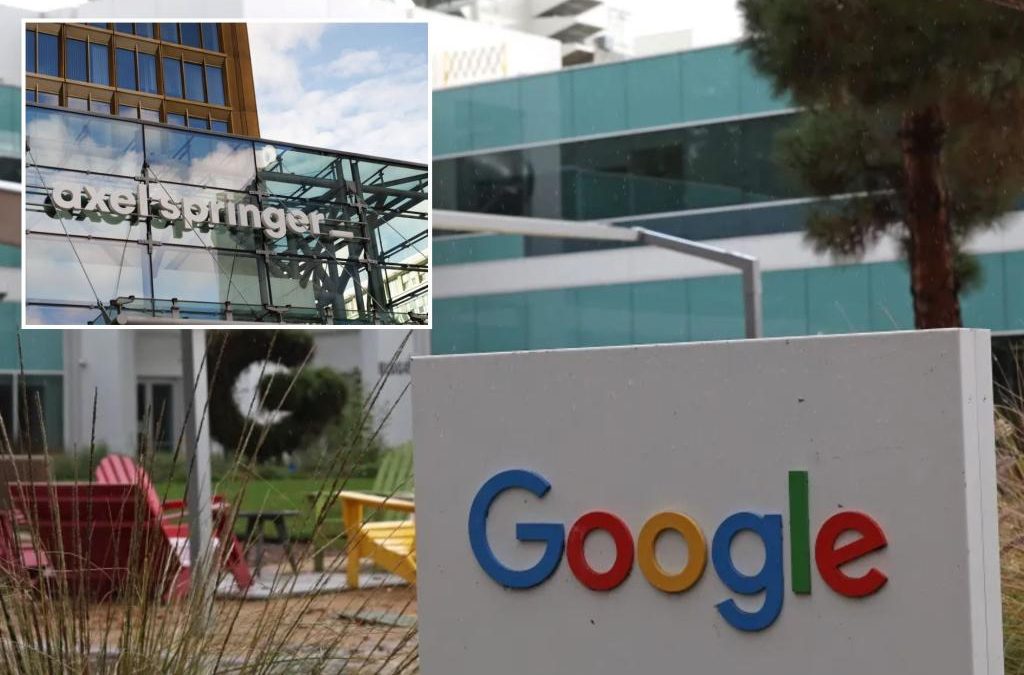Google on Wednesday was slapped with a $2.3 billion lawsuit by media giant Axel Springer and 31 other publishers, alleging that they suffered heavy losses due to the search giant’s practices in digital advertising.
The move by the group — which include publishers in Austria, Belgium, Bulgaria, the Czech Republic, Denmark, Finland, Hungary, Luxembourg, the Netherlands, Norway, Poland, Spain and Sweden — comes as Europe’s antitrust regulators crack down on Google’s ad tech business.
The tech giant also faces a landmark case in the US claiming it holds a monopoly over search.
Axel Springer, the parent company of Business Insider and the smaller publishers that account for the 55 brands in the complaint, garner over 1 billion monthly visits.
“The media companies involved have incurred losses due to a less competitive market, which is a direct result of Google’s misconduct,” the media firms’ counsel at Geradin Partners and Stek Lawyers said in a statement obtained by The Post.
“Without Google’s abuse of its dominant position, the media companies would have received significantly higher revenues from advertising and paid lower fees for ad tech services,” the lawyers added.
“Crucially, these funds could have been reinvested into strengthening the European media landscape.”
They cited the French competition authority’s nearly $240 million fine against Google on its ad tech business in 2021 as well as the European Commission’s charges last year to buttress their group claim.
The lawsuit was filed in the District Court of Amsterdam, “a key jurisdiction for antitrust damages claims in Europe,” the lawyers said.
Google’s legal director, Oliver Bethell, denied the claims in a statement to The Post, saying, “This lawsuit is speculative and opportunistic. We’ll oppose it vigorously and on the facts,” Google’s legal director, Oliver Bethell, said in a statement to The Post.
“We’ll oppose it vigorously and on the facts.”
Google last year said it disagreed with EU antitrust charges against its ad tech business where it is involved in both the buy-side as well as the sell-side of the ad-tech business.
“Google works constructively with publishers across Europe — our advertising tools, and those of our many adtech competitors, help millions of websites and apps fund their content, and enable businesses of all sizes to effectively reach new customers,” Bethell said.
“These services adapt and evolve in partnership with those same publishers.”
Representatives for Axel Springer declined The Post’s request for comment, instead advising to contact Geradin.
The European Union — which has implemented tougher regulations on Big Tech firms than American officials with the Digital Service Act, which took effect earlier this month — also slapped Google with a $2.7 billion antitrust fine in 2017 for market abuse related to its shopping service.
In the year’s since, Google has tried to skirt the fine, but Europe’s top court struck down the Mountain View, Calif.-based company’s last-ditch effort to avoid the payment last month, dealing a potential blow to the world’s most popular internet search engine.
The shopping case was the first of three EU decisions that resulted in a total of roughly $8.94 billion in fines for Google last decade.
In the US, Google has faced similarly costly litigation from the Justice Department, which alleged the company wielding illegal “monopoly power” that has “harmed consumers.”
Jerry Dischler, Google’s vice president of advertising products, admitted at the trial last September that the company has silently raised ad prices within its search results in order to hit revenue goals — and that the stealth changes resulted in hikes from 5% to 10% for advertisers.
Dischler said during his bombshell testimony Google often tweaks ad sales metrics for its advertising auctions, which determine which ads appear as top results in response to user prompts on the company’s search engine, by raising rates or the minimum required spending to secure placement.
“We tend not to tell advertisers about pricing changes,” Dischler said on the stand.
Despite the DOJ’s effort to expose its shady tactics during the closely-monitored search trial, several prominent anti-monopoly organizations – including Demand Progress, the Revolving Door Project, Fight for the Future and the Tech Oversight Project — have alleged that Google is still moving “full steam ahead” with anticompetitive practices.
A total of 15 groups urged a coordinated crackdown on the corporate giant, noting in a letter to FTC chief Lina Khan and the DOJ’s top antitrust lawyer Jonathan Kanter obtained by The Post that Google’s practices “demonstrate that even the DOJ’s lawsuit and heightened regulatory scrutiny abroad have not deterred the company.”
The letter points to three separate recent developments, including a reported partnership to embed Google search results within TikTok.
The tie-up surfaced last September — in the middle of the DOJ’s antitrust trial, where lawyers were laying out their argument that Google has relied on such deals to stifle potential competition.
US District Judge Amit Mehta is expected to render a decision in May.
With Post wires
Source




